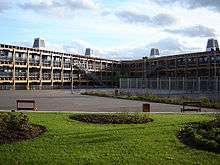
Academy (English school)
Academy schools are state-funded schools in England which are directly funded by the Department for Education and independent of local authority control.
Most academies are secondary schools. However, some primary schools, as well as some of the remaining first, middle and high schools, are also academies.
Academies are self-governing non-profit charitable trusts and may receive additional support from personal or corporate sponsors, either financially or in kind. They must meet the same National Curriculum core subject requirements as other state schools and are subject to inspection by Ofsted.
Types of academy
The following are all types of academy:
The English School
'The English School``
(The English School Old khanewal)

Church Educational System
The Church Educational System (CES) of The Church of Jesus Christ of Latter-day Saints (LDS Church) consists of several institutions that provide religious and secular education for both Latter-day Saint and non–Latter-day Saint elementary, secondary, and post-secondary students and adult learners. Approximately 700,000 individuals were enrolled in CES programs in 143 countries in 2011. CES courses of study are separate and distinct from religious instruction provided through wards (local congregations). Kim B. Clark, a member of the First Quorum of Seventy, has been the Commissioner of the Church Educational System since August 1, 2015.
Seminaries and Institutes of Religion
Seminaries
Religious education programs designed for secondary students are called seminaries. These are programs of religious education for youth aged 14–18 that accompany the students' secular education. In areas with large concentrations of Latter-day Saints, such as in and around the Mormon Corridor in the United States, and some places in Alberta, Canada, instruction is offered on a released time basis during the normal school day in meetinghouses, or facilities built specifically for seminary programs, adjacent to public schools. Released-time seminary classes are generally taught by full-time employees. In areas with smaller LDS populations early-morning or home-study seminary programs are offered. Early-morning seminary classes are held daily before the normal school day in private homes or in meetinghouses and are taught by volunteer teachers. Home-study seminary classes are offered where geographic dispersion of students is so great that it is not feasible to meet on a daily basis. Home-study seminary students study daily, but meet only once a week as a class. Home-study classes are usually held in connection with weekly youth fellowship activities on a weekday evening.
Academy (2007 film)
Academy (アカデミー) is a 2007 film directed by Gavin Youngs.
Cast
See also
External links
Academy 360
Academy 360 (formerly Pennywell Comprehensive School) is a coeducational all-through school for pupils aged 4 to 16. The school is located in the Pennywell area of Sunderland, Tyne and Wear, England.
Pennywell Comprehensive School was built in 1967, however in 2008 the school converted to academy status and was renamed Academy 360. In the same year the school relocated to a new building on the same site, with the old building being demolished. Academy is sponsored by Sunderland City Council, Sir Bob Murray and the Gentoo social housing group.
Academy 360 offers GCSEs and BTECs as programmes of study for pupils. Most graduating students go on to attend Sunderland College which acts as the school’s partner further education provider. Academy 360 also operates 'The Achievement Centre' which offers alternative education for small numbers of pupils from across Sunderland.
References
External links

School (TV series)
School!! (スクール!!, Sukūru!!) is a Japanese television series which premiered on Fuji TV on January 16, 2011. It was aired on Fuji TV's Sunday 9:00pm slot "Dramatic Sunday" in the 2011 winter drama season.
Plot
The story is about Shingū Elementary School which is beset by a lot of problems. Seichiro Naruse, a construction worker whose company closed down, suddenly becomes the principal of his old school. He must save the school from closing down.
Cast
Main Cast
The construction company he was working in went bankrupt and he was appointed as the civilian principal of the Shingū Elementary School. Having devoted 20 years in the construction industry, he has no teaching license. He takes up the job in order to keep a promise he made with his former teacher and ex-principal Takeichi. Nonetheless, he has a cheerful personality and takes positive action at every turn, and he frequently describes himself as a "X X demon". He was greatly appalled by the appearance and the change in his alma mater, which was struggling to change the status quo. In the last episode, Shingū Elementary School narrowly avoided closing down, but at the same time, he resigned to take responsibility for the incident that was caused by Akira Hara in the school.

Bleach (Nirvana album)
Bleach is the debut studio album by American rock band Nirvana, released on June 15, 1989 by Sub Pop. The main recording sessions took place at Reciprocal Recording in Seattle, Washington between December 1988 and January 1989.
Bleach was well received by critics, but failed to chart in the U.S. upon its original release. The album was re-released internationally by Geffen Records in 1992 following the success of Nirvana's second album, Nevermind (1991). The re-release debuted at number 89 on the Billboard 200, and peaked at number 33 on the UK Albums Chart and 34 on the Australian albums chart. In 2009 Sub Pop released a 20th anniversary edition of Bleach featuring a live recording of a Nirvana show in Portland, Oregon from 1990 as extra material. Since its release in 1989, Bleach has sold over 1.7 million units in the United States alone. It is Sub Pop's best-selling release to date.
Recording
Following the release of its debut single "Love Buzz" on Sub Pop in November 1988, Nirvana practiced for two to three weeks in preparation for recording a full-length album, even though Sub Pop had only requested an EP. The main sessions for Bleach took place at Reciprocal Recording Studios in Seattle, with local producer Jack Endino.
Podcasts:

